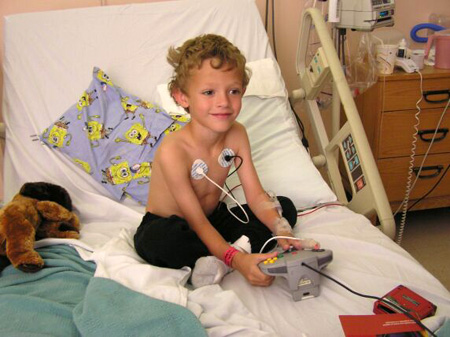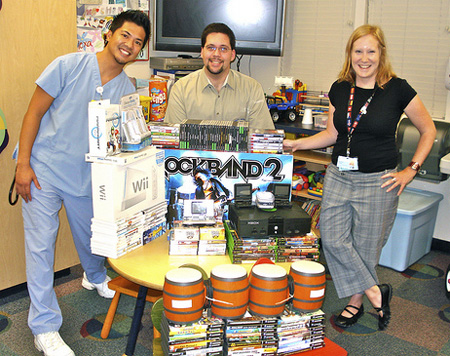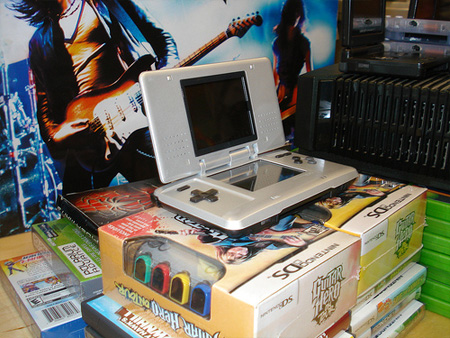In my continued attempt to explore charities with a geeky inclination, I came across Get Well Gamers, started by Ryan Sharpe. Get Well Gamers is an organization that furnishes children’s hospitals with video game consoles and games. His story and inspiration are personal ones. Having spent some time in the hospital as a youth, he experienced first hand the benefits video games have in recuperation and, now that he is older, wants to make sure that more children, if not all children, have the same access he did to video games.
What started out as a few friends talking about their hospital stays to an organization that now services hospitals in all 50 states, Get Well Gamers is in many ways a unique organization. Mr. Sharpe isn’t content to stop there, however — in the closing comments of our interview, he stated: “Pie in the sky, twenty years down the road I want us to be the Red Cross of Gamers. I want us to be anywhere that we are needed.” I hope that after reading the interview I conducted with Mr. Sharpe you will think of his organization the next time you’re tired of a game or dig an old console out of closet.
Kelly Melcher: Mr. Sharpe, anecdotally, how did Get-Well Gamers get started?
Ryan Sharpe: Well, it started out with a conversation I had with a few college friends of mine about various times we had been sick after one of our number had fallen ill and spent a week in the hospital. We were talking about “Well what did you guys do while you were sick?” and [one] said, “Well, oh, I just rested and played video games all week,” and one friend of mine said that he remembered being in the hospital with games and a third one said that he didn’t have games and wished that he had. And so, you know, that spurned on the question that “Someone should do this. Someone should put video games in the hospitals,” and I was the one who said, “Why not us?”
KM: When did you get Get Well Gamers started?
RS: Initially we made our first donation as a foundation in the Fall of 2001. We started out with two hospitals, one in California, which is my home state, and the other one in Washington, where I was going to school at the time.
KM: From 2001 to the present how have you grown?
RS: Well, we are now at 100 hospitals covering all 50 states so it has a pretty good growth since 2001.
KM: What population of hospital-goers does Get Well Gamers support? Is it just kids, or people of all ages?
RS: It’s mainly children but, you know, some places, especially like Oncology Wards and things like that where the chemotherapy patients come back week after week after week, they don’t just kick you out of the door when you turn eighteen, so some patients they have there are well into their 20s.

KM: What kinds of donations do you accept?
RS: Mostly just game consoles and games. Handhelds are very popular and very useful. We use everything as far back as the Nintendo 64 and everything as new as the Wii and the Playstation 3 and the Xbox 360, so we really run the gamut.
KM: If someone has something that is in disrepair or missing a part, will you still accept them?
RS: We will take just about everything. Some stuff we can fix, and if we can’t fix it we will use what parts we can to fix other things, etc.
KM: If someone wanted to contribute or participate in some way, how could they do so?
RS: First and foremost, we are always looking for new hospitals. If you have a son or a wife or a cousin or a friend who has worked at a hospital or has been a patient there and thinks that hospital could use this foundations services then there’s a handy form right on our website to add a new hospital to our donation network.
Past that, of course, we always need new games and new systems because things get lost or broken or stolen and need to be replaced. Of course, being a non-profit we none of us draw salaries or anything, but we still need money. There is always that kind of a sponsorship opportunity too.
KM: Where do the cash donations go to work?
RS: The money goes mainly to just shipping — I mean, you should see our FedEx bills every month, you know, sending as much as we do to as many places as we do. Especially stuff like a few pounds going out to our hospital in Anchorage or the one in Kapiolani in Hawaii, you know, those get real expensive real quick.
KM: What is the most rewarding aspect for you in starting Get Well Gamers?
RS: As someone who has been sick a lot myself and hospitalized many times just knowing that I am offering to other children the same elation I felt as a child when I first had access to video games when I was in a hospital. That sort of a trance of forgetting that you hurt, forgetting this needle that is stuck in your body and forgetting the “where you are” and “why you’re there”. Just being able to escape from that for a few hours at a time there’s really no comparison and to know that I am able to give back what I experienced to other children is, you know, it’s all the reward I need really.
KM: Conversely, what is the most challenging aspect?
RS: Honestly, it’s just trying to run a charity on virtually no budget. You know, I mean, we want to help and we want to do as much as we can for as many people as we can but just the physical reality of operating a business means that we have to make a lot of sacrifices. Let’s just say I know why it’s so easy for the rich to be charitable, but it’s much harder when you’re broke yourself.
KM: Where would you like to see Get Well Gamers go in the future?
RS: International, for one. We have actually just recently cleared our paper with the Canadian Revenue Agency, which is their version of the IRS, to start operating in hospitals up there and past that, we are looking to expand next year, hopefully to the United Kingdom and Australia. Just avoiding that language barrier for as long as we can. Five years and ten years, I expect to be all over mainland Europe and some Asia and those places where video games are already popular.
KM: What do you think sets you apart from other charities involved with children’s hospitals?
RS: Well, besides the fact that this is all based on direct personal experience of being hospitalized and going from the era of having no video games in hospitals to having video games in hospitals and knowing first hand the dramatic difference that makes, I think what would make us unique is the “by gamers for gamers” nature of the charity. We’re nobody special, we’re just a couple people who felt that “you know, this is the best we could do with what we have.”
Some people ask us, “Why video games, why not something like an X-ray machine or drugs or other things that the hospitals really need?” It’s like: “Look, if I knew medical supply people, if I knew pharmaceutical companies then yeah, sure that’s what I would do, but I don’t. I know game publishers, I game developers, I know the International Game Developers Association.” Those are my circle of contacts. We are just doing what we can to help with what we have available to us. Nothing special, you know, no grand message or anything like that — we’re just helping with what we have available. We just want to help.
KM: Is there anything else our readers should know about Get Well Gamers?
RS: Just that despite, as you said, the anecdotal experience, there’s hard science behind it. Doctor Patel, I believe her name was (side note: Information on Dr. Anuradha Patel’s study) in New Jersey did a study that showed that a Game Boy was more effective than tranquilizers in keeping children in preoperative theaters from becoming stressed and getting their heart rate up which makes anesthesia more risky. Just having something there to distract them from being shaved and dressed in the gown and all the other really sort of invasive preoperative things that they do to you, which to a child is terrifying, works better than chemical tranquilizers.
There are other ones too. Another study showed that over long hospital stays children with access to video games for pain management required 40% less pain killers, 60% less visits from the nurse and got out an average of I believe it was 27% faster. There’s hard science to this and that’s not even going into the physical therapy aspects of things like Dance Dance Revolution and Rock Band and games like that. Physical therapists will get children to do things that they really don’t want to do for the obvious reason that it hurts because they can have fun doing it. They don’t mind that it hurts because the pleasure of doing well at their game surpasses the pain. Anecdotes aside, there’s real hard scientific evidence that these are good things to have in hospitals medically.
I would like to thank Ryan Sharpe and Get Well Gamers on behalf of myself and my associates at Fandomania.com.









Kelly, thank you for doing this series. Earlier last month, I had decided to start donating and doing something where I’m thinking about someone other than myself. Your “Geeks Give Back” has helped me with that – I’ve put in my paperwork for Books for Soldiers and I’m pretty sure I can help out with this organization, too.
Thanks for spotlighting ways we can help others!
Pingback: 1-Up for Life: Video Gaming Charities |